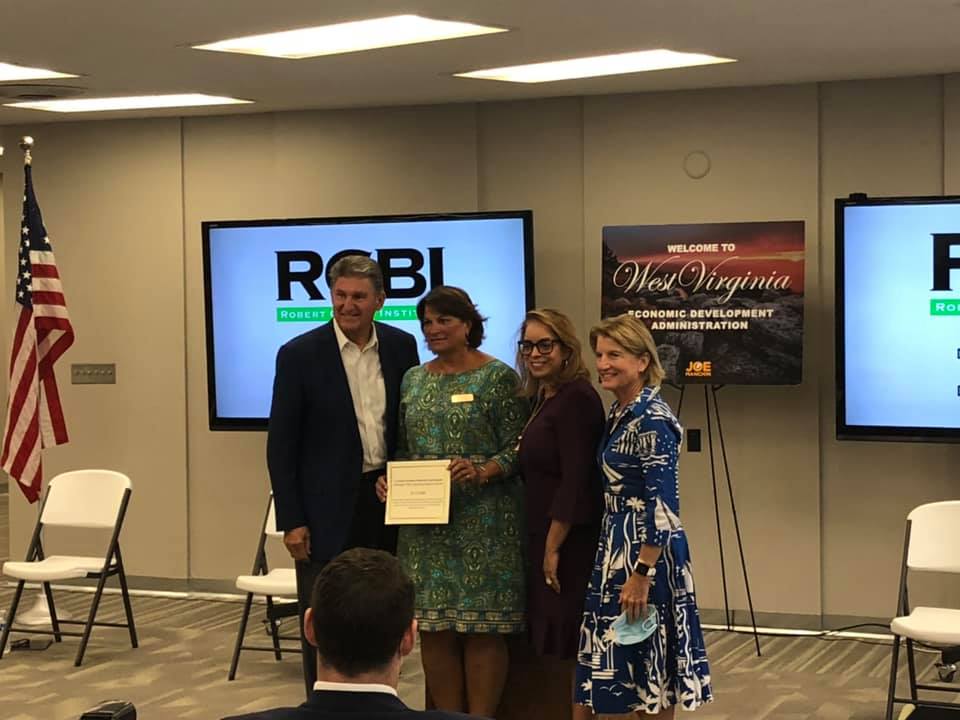MEDIA

Expanding Markets Initiative Offers Market Research Grants & Technical Assistance to Area Businesses

Above: Advantage Valley Director Terrell Ellis Accepts the Expanding Markets Initiative Grant Award from U.S. EDA
On August 17th the U.S. Department of Commerce Economic Development Administration (EDA) announced the award of $1.3 million dollars in funding to Advantage Valley Inc in support of an exciting new program, the Expanding Markets Initiative, which will provide technical services to 225 companies in the Charleston-Huntington Metro region over a three-year period. A unique mix of services will drive the program which is expected to help create of 143 jobs retain 184 jobs and help spur $11 million in new private investment over a three-year period.
“Services through the program will include assistance accessing various state and local finance, workforce training programs and other assistance programs, but will mainly be focused on delivering business to business networking resources as well as market research and funding for direct marketing services,” says Adam Phillips, Business Development Specialist for HADCO and one of three outreach representatives for the Expanding Markets Program.
A major portion of the program is being delivered through a unique partnership with an organization called the National institute for Economic Gardening, which will help administer a major technical assistance component of the new grant, the Economic Gardening Program.
What is Economic Gardening?
National Institute for Economic Gardening (NCEG) has its roots in Littleton, Colorado in 1987 when the city launched this innovative program in partnership with a Denver Think Tank called the Center for the New West. The idea was that their community should spend more time working to expand locally oriented stage 2 companies (early-to-mid cycle companies experiencing high growth), who also sold to external markets, and to shift away from its primary focus of trying to recruit large companies into the area. The rationale behind this development model was based on two factors. The first is that the majority of new job creation, 80% in fact, is created through the expansion of existing local employers, rather than the recruitment of new industry. The second is that while they only account for 15% of all existing companies, stage 2 growth companies, account for 40% of all new job creation. So focusing on this subset of businesses makes a lot of sense when trying to stimulate new jobs and investment. The model did prove an immense success and in 2008 the Edward Lowe Foundation partnered with the newly named National Center for Economic Gardening to support a national roll out of the program.
HADCO and its Advantage Valley partners are placing the Economic Gardening program at the center of its Expanding Markets Initiative. The development partners on this grant program will be actively recruiting stage 2 companies in the 9-county Advantage Valley region, to participate in this program. While Advantage Valley is committed to serving as broad of business constituency as possible and will maintain as much flexibility in the program as is practical, participating companies will need to loosely fit into the following list of criteria.
- Be a for-profit, privately held company headquartered and operating in Advantage Valley, West Virginia (Boone, Cabell, Clay, Kanawha, Putnam, Lincoln, Jackson, Mason or Wayne Counties)
- Have between $650,000 and $50 million in annual revenue (pre-COVID-19 or in 2020)
- Employ between 6 and 100 employees
- Demonstrate growth in employment and/or revenue for 2 of the past 5 years
- Sell or export to markets outside of Advantage Valley
Exceptions can be made for less profitable or larger companies who have demonstrated sales growth in a specific product line or division that represents a new business offering or a pivot for the company.
“Program staff have to be able to make the determination that NCEG program activities will have a substantial and sustained impact on the sales trajectory of the company,” says Phillips. “That is the key determining factor in the project selection process.”

Above: Expanding Markets Initiative Staff Heidi Pagur, Victoria Russo & Adam Phillips
What Can Companies Expect?
Participating companies will work directly with NCEG’s experienced staff. All work will be completed over a four-to-six period with c-level company representatives and upper management-level staff expected to participate throughout the process. Participating CEOs and management can expect to spend 8-12 hours over the four-to-six-week period directly involved in this process; participating in an initial discovery call, the development of a central planning document, two debriefing calls and a close out call, as well as continual email engagement throughout.
The economic gardening program utilizes state of the art corporate tools in commercial database searching, GIS, search engine optimization, listening post (consumer chatter, signals of change), network mapping (websites, LinkedIn, Twitter), web marketing and other social media. The NCEG’s team of specialists will help companies achieve their business goals by
- Identifying qualified leads by sorting contents of extensive databases
- Mapping geographic areas using GIS software to facilitate targeted marketing efforts
- Reviewing core strategies related to commodity and/or niche markets
- Examining social media utilization to connect with customers
- Placing the company website in front of more customers using search engine optimization
The finished product for each company is a recommendation package created by NCEG staff which details the research results of the defined areas an individual company is targeting, data about markets, competitors, industry trends, and most importantly qualified sales leads. The finished product may also provide details about how to align a company’s sales and production strategies, best management practices and answer fundamental business questions which will help solve pressing sales and marketing concerns.
On the backend of the project, HADCO and Advantage Valley staff will work with each participating company to deploy as much as $5,000 in marketing and technical assistance funding to begin the process of implementing the recommendations from the NCEG team.
Continuing a Great Partnership
The Expanding Markets Initiative is, in part, a progression of the outstanding work completed as part of the Appalachian Hatchery program. This three-year grant program, administered between 2017 and 2021, helped to retain 284 existing jobs, to create 203 new jobs and encouraged more than $8.5M in new capital investment throughout a 17-county territory in WV. The project also helped to launch 35 new businesses and led to 28 new products or services being brought to market. Much of the program’s success was the result of the collaborations between the project’s two main grant partners, Advantage Valley and Robert C. Byrd Institute. The synergies created through these partnerships have been outstanding and will undoubtedly continue with the Expanding Markets Initiative.
Both the Appalachian Hatchery program and the new Expanding Markets Initiative are funded by the federal Economic Development Administration (EDA) through programs specifically targeted to communities impacted by the declining coal economy. Many of West Virginia’s businesses are facing step declines in sales due to mine closures and an overall decline in domestic coal production. Much of the Huntington area economy is tied directly or indirectly to the coal industry. As contracts to coal mining operations and various support industries decline, local companies, representing everything from equipment manufacturers to machine shops, to transportation and logistics providers, are either replacing those contracts with business that pays far less, or not replacing those contracts at all. This is the core problem the grant program and partners are trying to address.
“Assisting Advantage Valley companies in securing new sales and service contracts is our first priority,” says Phillips. “The Economic Gardening program will help companies in our region secure qualified customer sales leads. New sales will hopefully translate to more stable and vibrant businesses in our communities, leading to new investment and increases in wages and employment opportunities.”
When it’s all said and done, the program is about supporting our local businesses and, to this end, continues a great partnership with the U.S. Department of Commerce’s Economic Development Administration (EDA).
“Advantage Valley’s existing businesses are the region’s most important economic asset and that is why our Expanding Markets team is here to support their growth and expansion, says Terrell Ellis, Executive Director of Advantage Valley Inc. “This program will help companies identify new customer opportunities, gain access to new market areas, as well as improve supply chain connections within our region. Nurturing locally owned businesses that employ local workers with living wages is essential to creating a sustainable economy,”
As the only federal government agency focused exclusively on economic development, the U.S. EDA plays a critical role in facilitating regional economic development efforts in communities across the nation. Guided by the basic principle that sustainable economic development should be locally driven, EDA works directly with communities and regions to help them build the capacity for economic development based on local business conditions and needs.
“We are very grateful for our partnership with EDA who understands the importance of regional collaboration. Our economic development organizations have worked hard to foster that spirit of collaboration in our region, and that’s why EDA’s support is so meaningful”, said Ellis.
Funding from this program will continue federal, state, and local efforts to support the diversification of West Virginia’s economy and provide much needed support for businesses seeking to diversify their customer base.
For more information about this grant or the services offered to existing businesses, and how you can apply, please call Adam Phillips, Business Development Specialist for HADCO at 304.525.1161 or via email at aphillips@hadco.org.
